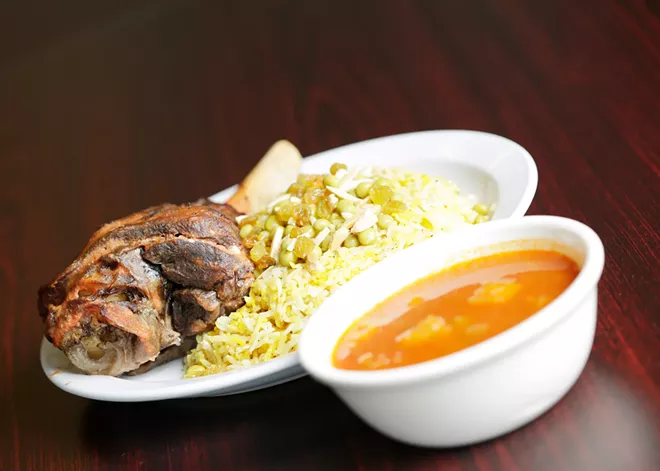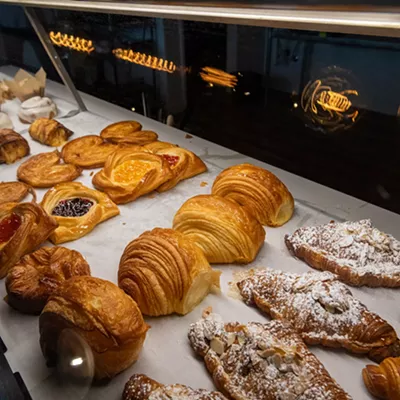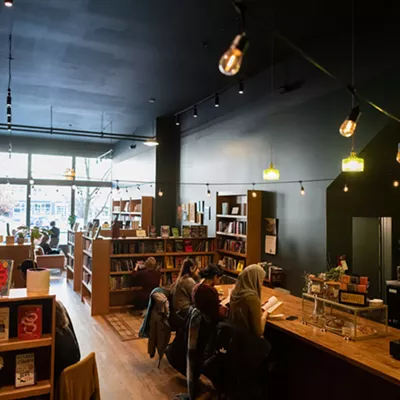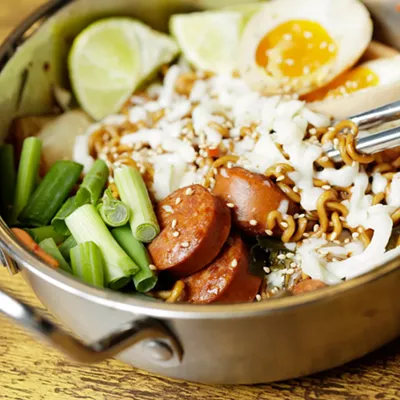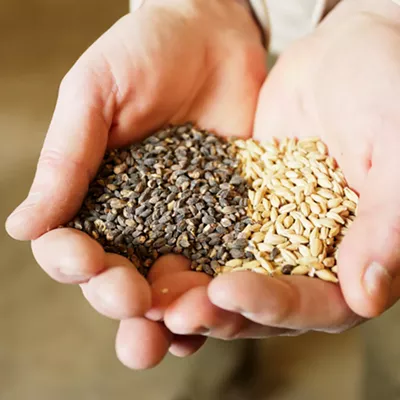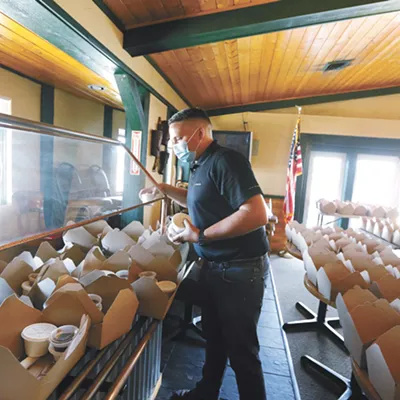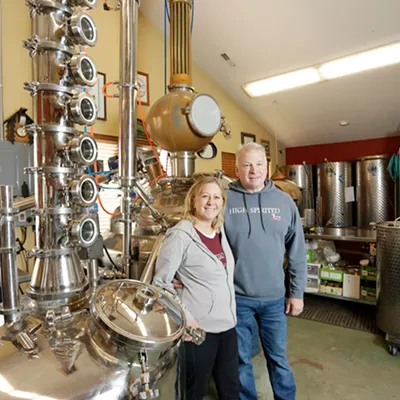When war broke out in Syria in 2011, Abdulkareem Mahmoud had to leave his life and his family restaurant behind. He'd grown up in the industry, starting at age 8 when he began helping his father in their family business that specialized in savory pastries.
His father eventually passed the business on to his children, and Mahmoud had been running the restaurant for 10 years when civil war broke out between Syria's Bashar al-Assad regime and rebel groups.
"The war started, and everything he put in to make the [restaurant] run successfully and like everything is gone," says Maher Mahmoud, Abdulkareem's eldest son.
Maher is a co-owner alongside his father and brother, Mohammad, of the family's new restaurant, Arabian Palace, which opened Jan. 4 in the corner space of a small retail complex on East Sprague Avenue in Spokane Valley.
The interior of the Middle Eastern restaurant is modern but cozy, with a kiosk area for checkout and a cold case displaying handmade desserts like baklava ($5.50-$6.50) and knafeh ($6.50), a sweet cheesy pastry. Though the restaurant is currently light on decor, the food does plenty of talking.
When people think of Middle Eastern cuisine, oftentimes shawarma is the first thing that comes to mind. Arabian Palace aptly serves shawarma, seasoned meat stacked and slow roasted until tender, and served wrapped in lavash bread. Ordered by itself ($9-$10) or as a combo ($14.50-$15.50) with fries, it's the perfect lunch.
However, Maher recommends diners challenge their comfort zone and order something they've never tried before as well.
"I think the name of the food, it's different, so that's why people are afraid to try it. But when they try it they will like it and they start to order it [again]," Maher says.
Arabian Palace's entire menu is made fresh daily by hand, with nothing frozen, ensuring high quality for reasonable price points.
For those unfamiliar with Middle Eastern cuisine, Maher recommends the lamb ouzi ($18.50), an aromatic rice dish topped with peas, cashews, almonds, raisins and seasoned, tender lamb that's served with saloona, a tomato-based sauce.
If you're not quite sure what to try, order the mixed appetizer plater ($12.50) with hummus, baba ghanoush (roasted eggplant), doma (grape leaves filled with rice, tomato and garlic) and kibbeh (ground beef, onion, walnut and bulgur wheat).
Arabian Palace's savory pastries ($7.50-$8), called fatayer, have a pizza-like appearance, making them more approachable to a Western palate. The fatayer come in varieties like cheese, za'atar (a spice blend with earthy, citrus and nutty undertones), muhammara (tomato, onion, ground chili olive oil, black seed and cheeses), and ground beef marinated with tomato, onion and pomegranate molasses.
On a cold day, a bowl of lentil soup ($8) is a great side or can be enjoyed alone as a lighter meal, served with pita bread.
For a good dose of probiotics, get a cup of ayran ($3), served in a traditional copper cup. This savory yogurt drink will take your tastebuds for a ride with its sour and salty kick and subtle minty aftertaste.
Vimto ($3.50), a popular mixed berry soft drink in the Middle East, is another beverage choice. Maher also hopes to bring a sweet and tangy tamarind drink to the menu during the month of Ramadan (this year Feb. 28 to March 29), a time when it's commonly drunk for a kick of sugar after a long day of fasting.
Other additions to Arabian Palace's menu are also in the works, with plans to test and potentially add customizable bowls and another favorite Middle Eastern food: falafel.
The Mahmouds' experience cooking and running a restaurant was one of the few things the family could take with them after fleeing Syria in 2011 and initially taking refuge in Jordan, where they lived for four years.
There, Abdulkareem worked in the bakery department of a mall, and Maher dropped out of school at age 11 to help support the family, working multiple jobs like welding.
A representative of the United Nations High Commissioner for Refugees then called the family, accepting their case and helping them move to the United States. In 2015, after a series of interviews and background checks, Abdulkareem moved to Spokane with his wife and four children.
The Mahmoud family lived in Spokane for about three years, but then decided to move to Kentucky in search of better work opportunities. When the Southern climate wasn't agreeable to Abdulkareem's health, however, they decided to return to Spokane six months later.
When Feast World Kitchen opened in 2019, Abdulkareem was one of the first chefs to bring authentic, fresh Syrian cuisine to the Inland Northwest via his monthly menu.
"My dad started working with Feast World Kitchen and ... he was also doing part time [work at the] Salvation Army," Maher says. "That's what he was doing until he said, 'I want to open my own business.'"
For five years, the family looked for locations around Spokane to open their Middle Eastern restaurant, eventually finding the spot on East Sprague to make their dream a reality.
With the fall of the Assad regime on Dec. 8, 2024, the Mahmouds also now have the opportunity to visit their homeland since leaving 14 years ago.
"My family on my mom's side is still in Syria," Maher says. "We hope [Arabian Palace is] going to be running successfully — that way [we can also] give back to our family, especially right now with everything settled in Syria, [and] help them to build their house back and everything, to find a good place to live in."
"I want to thank the Spokane community and thank them for their support," he says, translating for his father, Abdulkareem. "And also, I would like the people who did not try our food, please come try it and give us your feedback."
Arabian Palace • 4902 E. Sprague Ave., Spokane Valley • Open daily 10 am-9 pm • 509-251-3459

